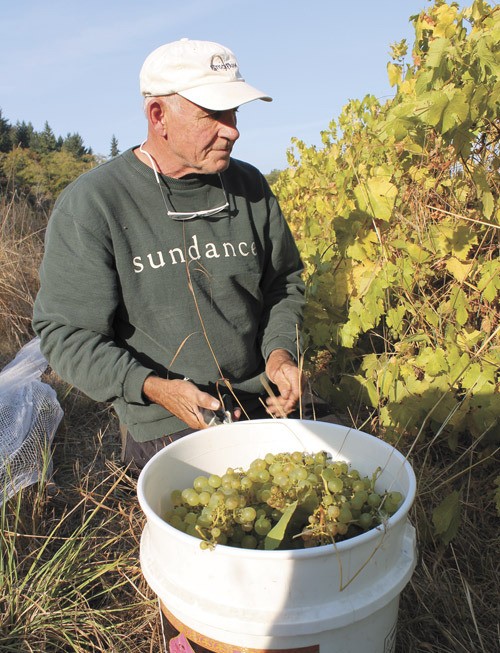The sun was low in the sky, casting a golden hue over rows of tangled grapevines as Ron Irvine and Jim Stewart methodically plucked this year’s abundant crop from the twisted stocks. Two more men — Joe Curiel and Tony Raugust — suddenly showed up, carrying buckets and smiling.
“We’re here to help,” Curiel said. “When you get a call to pick, you have to pick.”
The four men plucked bunches of tender green grapes for the next hour, filling one white bucket after another — a seasonal activity that doesn’t happen all that often on Vashon.
It’s been a tough couple of months for those plants and animals that need water, for grassy lawns and Eastern Washington forests. The region saw 80 straight days without any measurable rain between July and early October, making it the driest stretch on record as well as one of the West’s worst wild fire seasons.
But for Vashon’s nascent grape-growing community, September brought the kind of weather their sun-loving, heat-seeking vines need.
At Stewart’s farm last week, the men picked 55 buckets of grapes — a variety called chasselas that originated in Switzerland and produces a full, fruity wine — enough to fill nearly two barrels or make 200 bottles of wine.
“That’s a record from that vineyard,” said Irvine, owner of Vashon Winery. “It’s good. It’s really good.”
Curiel and Raugust, meanwhile, are gearing up for their own harvest at Monument Farms Vineyards — a swath of gently sloping land on the southern end of Monument Road, where they planted 460 pinot noir vines eight years ago. They’re holding off as long as they can, Raugust said, hoping to get the sugar content a little higher and the acid levels a little lower. But the vines are already laden with plump, purple grapes.
“I’m happy with where we’re at right now,” Raugust said.
Curiel grinned. “I’m more than happy. I’m ecstatic.”
Apples, too, are abundant this year. Last year, the Vashon Island Fruit Club had a record 1,600 pounds of apples for its annual CiderFest. This year, club members — who visit various Vashon orchards, picking apples for the event — came in with more than 3,000 pounds, said Ron Weston, a Vashon grower and president of the Western Cascades Fruit Society.
“I’ve been picking apples for the last 10 days,” Weston said Saturday, pausing from his responsibilities at CiderFest. “It’s been a bumper crop.”
Vashon’s small but determined crop of grape-growers has been working hard over the years to find the right kind of grapes and best growing techniques for the region’s cool, maritime weather. The Island has about 10 acres of land cultivated as vineyards and a growing number of vintners trying their hand at it.
Some years are disasters. Last year, Irvine said, he wasn’t able to secure any Vashon-grown grapes. “They just never ripened,” he said.
Weather isn’t the only challenge Vashon’s grape-growers face. Birds and deer take a toll, as do raccoons. Last week, over the course of two evenings, Curiel and Raugust lost nearly their entire crop of table grapes to raccoons — some 75 to 80 pounds.
But Vashon may have one strike in its favor. According to a study by Stanford University last year, climate change will likely result in temperatures too hot for northern California vineyards, shifting wine country north to western Oregon and Washington. Indeed, Irvine said he already senses a change in the growing patterns on the Island.
The springs have been cooler and wetter, the falls drier and hotter, he said. “The whole season seems to have shifted a month,” Irvine said.
Last week, as the men worked, they talked about both the joys and struggles of grape-growing on Vashon. They picked at Stewart’s Back Bay Vineyard, an undulating expanse of land on Quartermaster Drive, next to a corral with a pair of horses and a pasture where three elk grazed.
Stewart, an elk hunter, was given an elk years ago as a gift and has kept a small herd ever since. One year, the elk herd got into the vineyard. “That was a disaster,” he said.
The vines at Back Bay are old and twisted; they were planted more than 50 years ago and have gotten little attention over the years, Irvine said.
But they’re also hardy, with deep roots and strong stocks. And according to Irvine, they make a wonderful white wine called Chasselas Doré — fruity, dry and delicate, he said.
Stewart gives Irvine the grapes, which he crushes at his winery off of 156th Street. In return, Stewart receives 20 percent of the bottles those grapes produce. “It’s a good deal,” Stewart said.
Curiel and Raugust, who hadn’t met Stewart until they showed up at his vineyard last week, said there’s a sense of camaraderie among grape-growers and wine aficionados. They often help each other bring in the fruit when it’s time to harvest.
Irvine smiled at Curiel and Raugust, clearly happy they showed up. “They’re like the cavalry,” he said.
Stewart agreed, noting he was glad for the help. He shook his head as he reached into pluck another cluster.
“My goodness, there are a lot of grapes,” he said.



